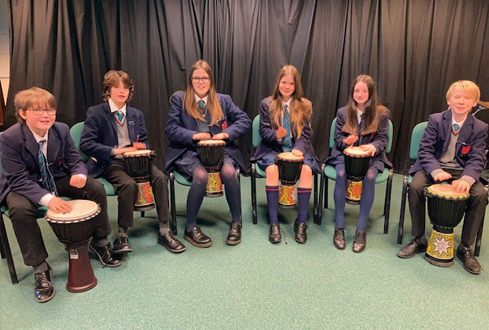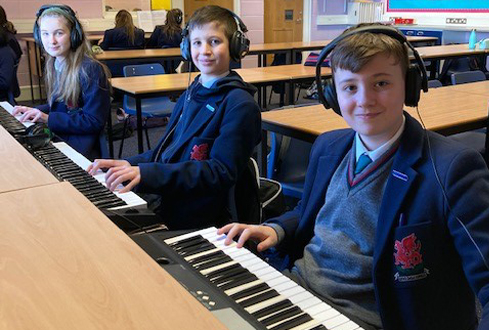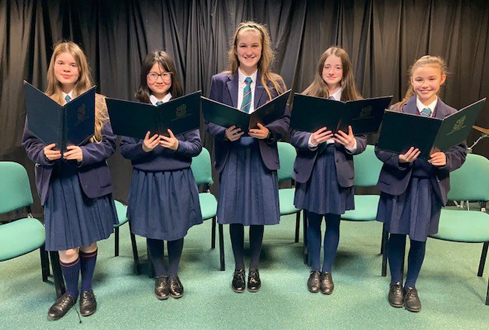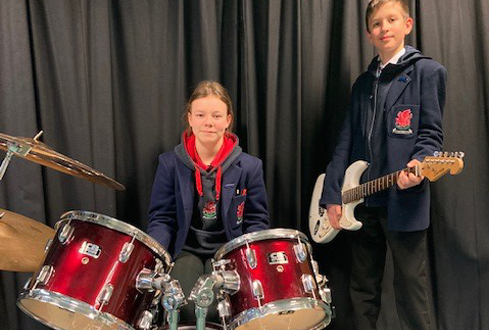In the Music Department we provide opportunities for pupils to gain skills, knowledge and understanding in the following areas:
Controlling sounds made by the voice and instruments;
- Responding and reviewing own and others’ work;
- Listening and applying knowledge and understanding;
- Communicate musical ideas to others by means such as speaking and writing;
- Performance – both individual and ensemble;
- Creating and developing musical ideas in response to a stimulus.
Pupils will experience a variety of experiences/activities during a unit and during an individual lesson. There will be many opportunities for individual and/or group activities, e.g. performing, listening, composing, writing, discussion, appraising and using ICT equipment.
In the Music Department pupils will have the opportunity to study Music at Key Stage 3 and beyond to AS and A Level.
The Music Department not only teaches Music as a subject but provides endless opportunities for pupils to perform it outside of school in an extra curricular setting. Pupils are encouraged to be part of the various clubs such as Junior & Senior Choir, Orchestra, Concert Band, Woodwind Group, Brass Group and the String Group. There are many events in the Music Department that allow the pupils to showcase their talents such as:
- Prize Distribution
- Annual school Musical Production
- Christingle Service
- Open Evenings
- College Assemblies
- Music Festivals
- Charity Events
Key Stage 3
Year 8
- Elements of music and ostinato.
- Keyboard Skills & Notation
- Danse Macabre
- Ringtone Composition
- Instruments of the Orchestra
- Carnival of the Animals
- World Music
Formative assessment: 4 written tests, 3 spelling tests, 3 homeworks, 2 performances, 2 Compositions, Keyboard Performance (Clog Dance & Donkey Riding) and a summer exam.
Year 9
- Elements of Music, Accidentals, Form & Tonality
- Film Music, Tonality and Form
- Musicals
Formative assessment: 3 written tests, 2 spelling test, 4 homeworks, 2 Compositions, Keyboard Performances (Fur Elise, Pirates of the Caribbean & Harry Potter) and a summer exam.
Year 10
- Twentieth Century Music
- Popular Music and Chords
- Garageband tasks on the iPad
Formative assessment: 3 written tests, 3 homeworks, 1 Composition, Performance (Sweet Dreams & Bohemian Rhapsody) and a summer exam.
GCSE
- Western Classical Music 1600-1910
- Handel: For Unto Us a Child is Born from Messiah
- Mozart: Horn Concerto No. 4, third movement
- Berlioz: Symphonie Fantastique, fourth movement
- Film Music
- Coates: March (The Dam Busters) from The Dam Busters
- Williams: Superman Theme from Superman
- Horner: Young Peter from The Amazing Spider-Man
- Musical Traditions of Ireland
- Beoga: Prelude Polkas: Prelude Polka, Paddy’s Polka No. 2 and Millstream Reel
- Stonewall: Fife Medley: Boys of Belfast and The Girl I Left Behind
- Popular Music 1980-present day
- Eurythmics: Sweet Dreams (Are Made of This)
- Ash: Burn Baby Burn
- Florence and the Machine: Cosmic Love
A Level
AS Level
| AS 1: | A solo performance at a level equivalent to at least Grade 4 standard of 5 to 7 minutes duration and a viva voce | Assessed by Visiting Examiner | 32.5% of AS13% of A level |
| AS 2: | A composition task (option A) or composition with music technology task (option B) of 1½ to 2½ minutes duration accompanied by a written commentary of no more than 1000 words | Internally assessedExternally moderated | 32.5% of AS13% of A level |
| AS 3: | Three compulsory areas of study, each containing four set works: Music for Orchestra 1700–1900; Sacred Vocal Music (anthems) and Secular Vocal (musicals) | A 1 hour test of aural perception and a 2 hour written examination | 35% of AS14% of A level |
A2 Level
| A2 1: | A solo performance at a level equivalent toat least Grade 5 standard of 8 to 10 minutesduration and a viva voce | Assessed by Visiting Examiner | 19.5% of A level |
| A2 2: | A composition task (option A) or composition with music technology task (option B) of 2 to 3 minutes duration accompanied by a written commentary of no more than 1200 words | Internally assessedExternally moderated | 19.5% of A level |
| A2 3: | Three compulsory areas of study eachcontaining four set works: Music for Orchestra in the Twentieth Century; Sacred Vocal Music (mass/requiem mass) and Secular Vocal Music (1600 to the present day) | A 1¼ hour test of aural perception and a 2 hour written examination | 21% of A level |
Careers
If you have decided to study music at degree level, you are probably interested in theoretical knowledge as well as the wider aspects of the music industry
Job options
Jobs directly related to your degree include:
- Music therapist
- Musician
- Private music teacher
- Secondary school teacher
- Sound technician, broadcasting/film/video
Jobs where your degree would be useful include:
- Arts administrator
- Broadcast engineer
- Community arts worker
- Event organizer
- Radio broadcast assistant
- Radio producer
- Theatre stage manager
Useful Websites






